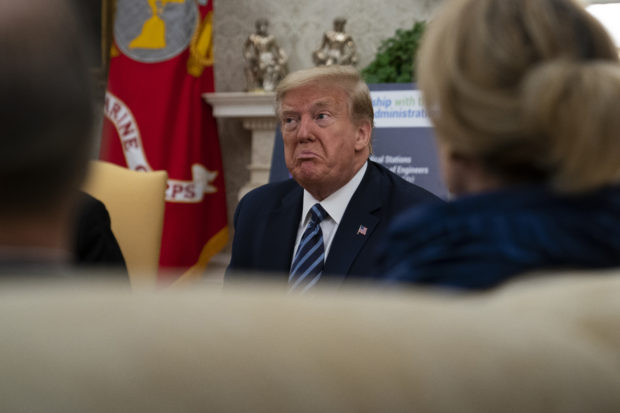WASHINGTON — Trying to dispel economic gloom, President Donald Trump said Thursday that he’s anticipating a major rebound in the coming months and a “spectacular” 2021.

President Donald Trump speaks during a meeting about the coronavirus response with Gov. Phil Murphy, D-N.J., in the Oval Office of the White House, Thursday, April 30, 2020, in Washington. (AP Photo/Evan Vucci)
While economists are warning of serious long-term damage as the country plunges into recession because of the coronavirus, Trump is predicting a strong fourth quarter thanks to pent-up demand.
“I think we can actually surpass where we were,” Trump told reporters in the Oval Office, while allowing he was relying on his gut.
“I feel it,” he said. “I think sometimes what I feel is better than what I think, unfortunately or fortunately.”
Trump’s comments came during a meeting with New Jersey Gov. Phil Murphy, a Democrat, who exchanged praise with the president, despite past criticism.
Trump said Murphy had “stepped up to the plate.” Murphy said Trump had delivered in his state’s darkest hour — and asked for more help.
“We’ve been crushed and appreciate your consideration on the financial side as well,” Murphy said. He told the president his state needs $20 billion to $30 billion just to keep firefighters, teachers, police officers and others on the job.
Trump is trying to turn the page on the virus, even as the nation’s death toll continues to climb and jobless claims rise. He was scheduled to deliver afternoon remarks about the importance of protecting older Americans during the pandemic.
His campaign aides have grown increasingly concerned that fallout from the virus outbreak is eroding Trump’s support among older voters.
Aides have warned the president that seniors, who are among the most vulnerable to COVID-19, have been rattled by the administration’s scattershot handling of the crisis and Trump’s increasingly contentious daily press briefings, according to two campaign officials who spoke on condition of anonymity because they were not authorized to speak publicly about private conversations.
Older Americans are an important component in Trump’s reelection strategy. People older than 45 composed a larger share of voters than the national average in 2016 in all six states that both sides consider the most likely to determine the next president, especially Arizona, Michigan and, above all, Florida.
It has been more than two decades since a Democratic candidate won seniors, but the Trump campaign has begun to fear that Biden could be poised to do the same or at least cut into Trump’s margin with the group.
Trump had centered his reelection message before the outbreak around his stewardship of a strong economy. But with more than 30 million Americans filing jobless claims and the stock market plunging from record highs in recent weeks, the president’s prosperity pitch to voters has become complicated.
Economists have warned a sharp comeback may not be realistic. They point to expected flare-ups that could force reopened businesses to shut down again, concerns that employees and consumers afraid of contracting the virus could continue to stay home, and the fact that shuttered businesses may not open again.
With so much of the economy paralyzed, the Congressional Budget Office has estimated that economic activity will plunge this quarter at a 40% annual rate.
Trump has consistently given high marks to his administration’s handling of the virus, despite persistent criticism that he waited too long to act.
“I think we did a spectacular job,” he said, days after the nation’s reported death toll surpassed the Vietnam War, with more than 60,000 dead and a million infected.
As Trump touted his administration’s handling of the crisis, the Labor Department announced an additional 3.8 million laid-off workers applied for jobless benefits last week, raising the total to about 30.3 million in the six weeks since the outbreak took hold.
Larry Kudlow, the president’s top economic adviser, acknowledged that the new unemployment numbers were “rough” and that the economy remains mired in a “deep, painful, hardship-ridden contraction.” But he said the new unemployment numbers also provided a glimmer of hope that the economy will soon snap back.
Trump, who has stayed close to the White House for the last six weeks as he’s dealt with the pandemic, is eager to get out of Washington as he seeks to address his sagging poll numbers.
The president said on Wednesday that he will travel to Arizona next week for a visit to a Honeywell facility producing critical equipment for health care workers.
Vice President Mike Pence has stepped up his travel outside Washington in recent days as the administration attempts to nudge the nation back toward a semblance of normalcy. He traveled to Indiana on Thursday to visit a facility where General Motors and Ventec Life Systems workers are building ventilators.
Marc Short, Pence’s chief of staff, said the vice president hopes to resume participating in small events in support of the reelection effort soon.